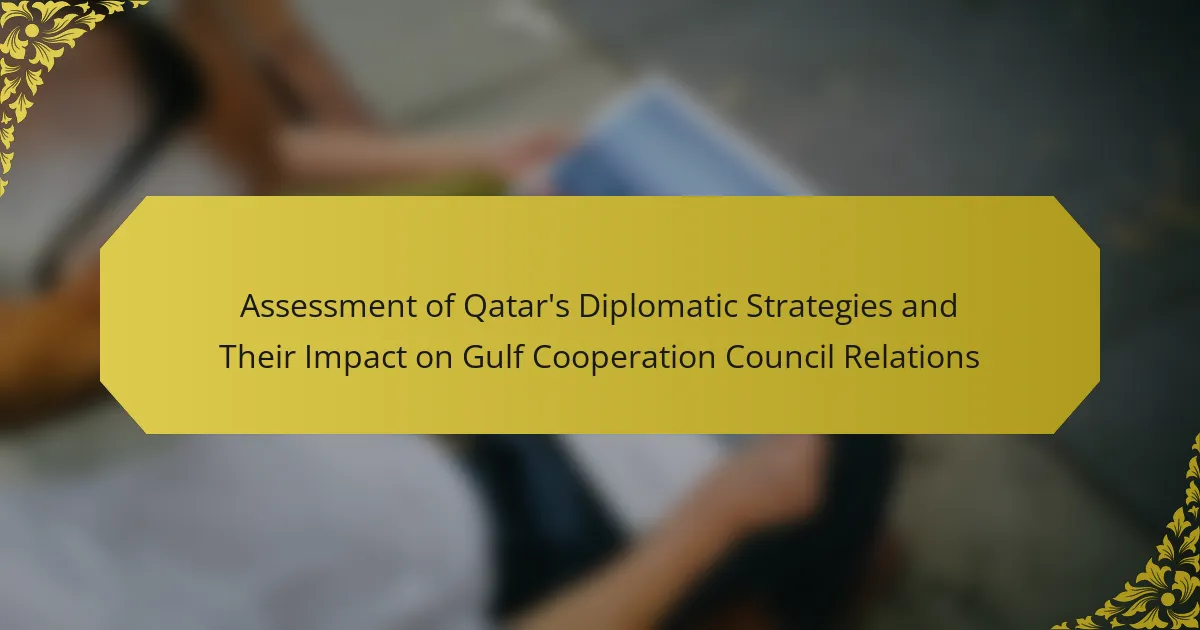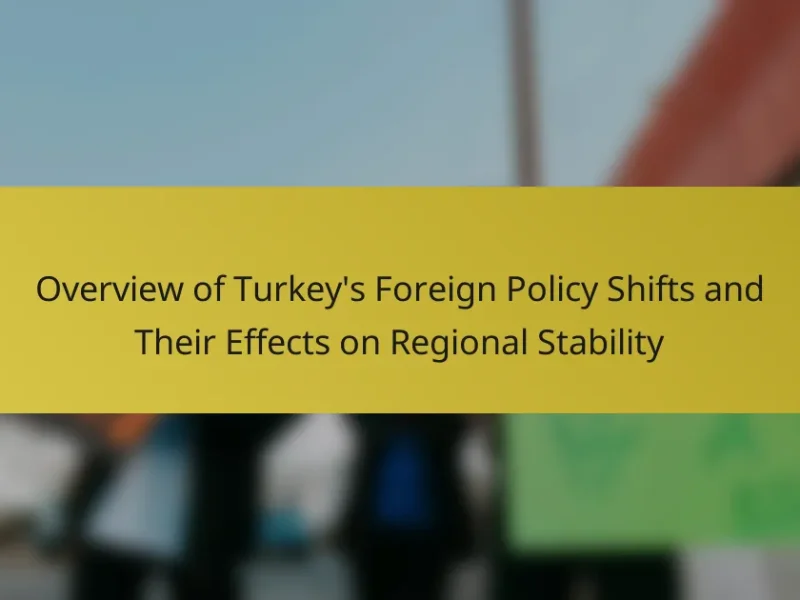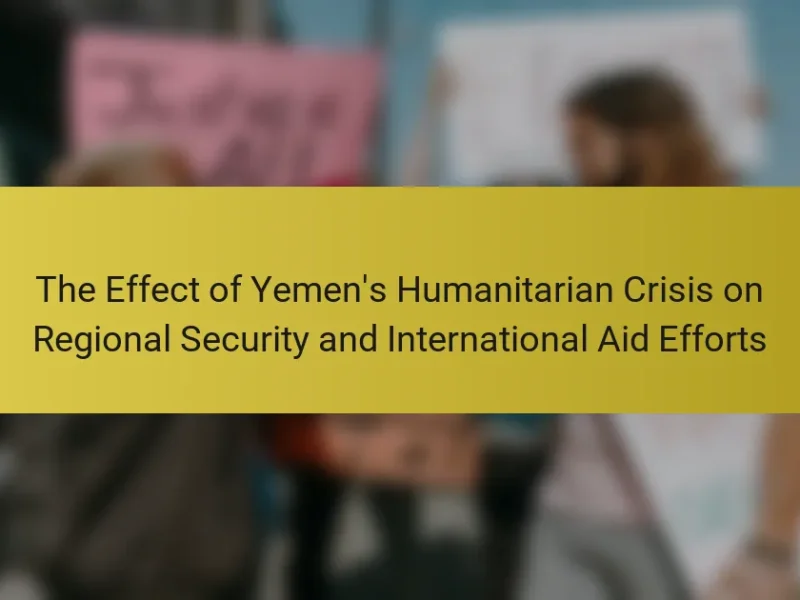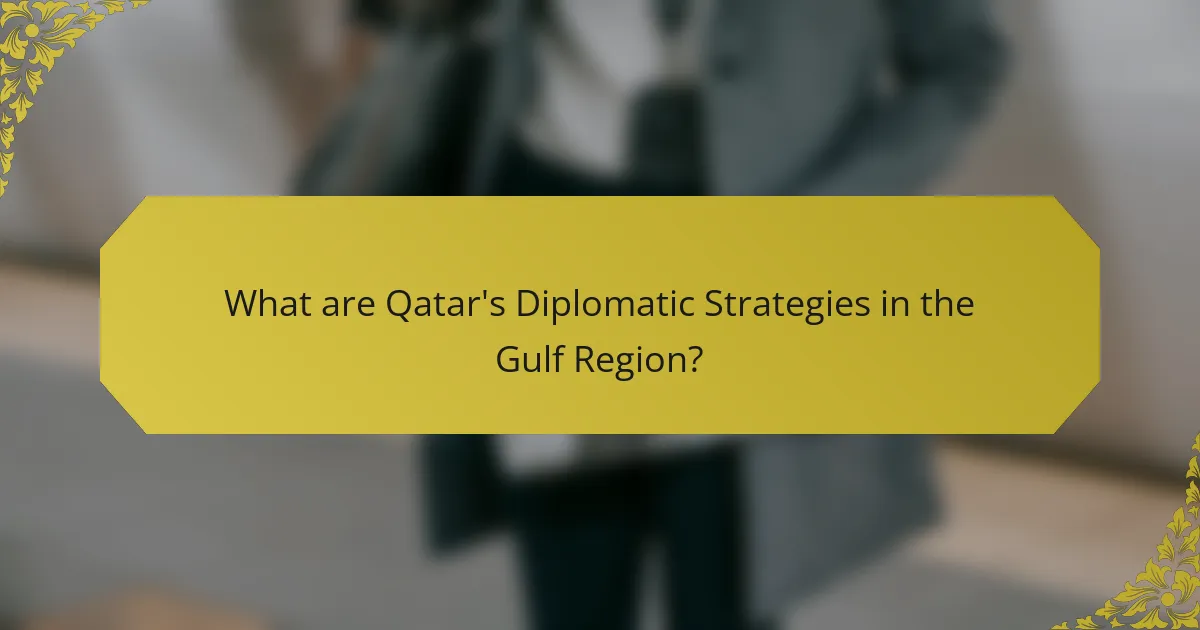
What are Qatar’s Diplomatic Strategies in the Gulf Region?
Qatar’s diplomatic strategies in the Gulf region focus on mediation and soft power. Qatar emphasizes dialogue to resolve regional conflicts. It actively mediates disputes, notably in Lebanon and Sudan. The nation leverages its wealth for influence through investments and aid. Qatar maintains relationships with various political groups, including those considered adversarial by its neighbors. The country hosts international negotiations, enhancing its role as a neutral facilitator. Qatar’s strategy also includes cultural diplomacy, promoting its heritage through events like the Doha Film Festival. These approaches aim to bolster its regional standing and foster cooperation within the Gulf Cooperation Council.
How have historical events shaped Qatar’s diplomatic approach?
Qatar’s diplomatic approach has been significantly shaped by historical events such as its independence in 1971. This event marked the beginning of Qatar’s efforts to establish a distinct foreign policy. The Gulf War in 1990 further influenced Qatar’s stance, prompting a focus on regional security and alliances. Qatar’s hosting of the U.S. military base at Al Udeid in 2003 underscored its strategic partnerships with Western powers. The Arab Spring in 2011 led Qatar to support various movements, reflecting its willingness to engage in regional dynamics. The blockade imposed by Saudi Arabia and its allies in 2017 tested Qatar’s resilience and reinforced its independent foreign policy. Each of these events has contributed to Qatar’s unique diplomatic identity, characterized by a balancing act between regional and global influences.
What key milestones define Qatar’s diplomatic history?
Qatar’s diplomatic history is defined by several key milestones. The establishment of diplomatic relations with the United States in 1972 marked a significant turning point. In 1995, Qatar’s Amir, Sheikh Hamad bin Khalifa Al Thani, initiated a foreign policy shift towards greater independence. The hosting of the U.S. military base at Al Udeid in 2003 solidified Qatar’s strategic importance in the region. In 2010, Qatar became the first Arab nation to host the FIFA World Cup, enhancing its global diplomatic profile. The 2017 diplomatic crisis, where several Gulf states severed ties with Qatar, tested its foreign relations. Qatar’s active mediation in regional conflicts, such as in Sudan and Lebanon, showcases its diplomatic engagement. Additionally, Qatar’s investment in global initiatives, including education and humanitarian aid, reflects its commitment to soft power diplomacy.
How did the Arab Spring influence Qatar’s foreign relations?
The Arab Spring significantly influenced Qatar’s foreign relations by prompting a shift towards more assertive diplomacy. Qatar supported uprisings in Libya and Syria, aligning itself with opposition groups. This support enhanced Qatar’s image as a champion of change in the Arab world. Additionally, Qatar’s involvement in these conflicts increased its regional influence and strengthened ties with the United States and Turkey. The Arab Spring also led to tensions with some Gulf Cooperation Council (GCC) states that opposed interventionist policies. Consequently, Qatar’s foreign policy became more independent and proactive, reflecting its desire to be a key player in regional politics.
What are the primary goals of Qatar’s diplomatic strategies?
The primary goals of Qatar’s diplomatic strategies include enhancing regional stability, fostering economic partnerships, and promoting cultural diplomacy. Qatar aims to be a mediator in conflicts, contributing to peace in the Gulf region. The nation actively engages in multilateral diplomacy through organizations like the Gulf Cooperation Council (GCC). Economic diversification is a key goal, as Qatar seeks to strengthen trade relations and attract foreign investment. Cultural diplomacy is pursued to promote Qatari heritage and build international relationships. Qatar’s hosting of global events, such as the FIFA World Cup 2022, exemplifies its strategy to enhance its global image. These goals are supported by Qatar’s significant investments in international media and education initiatives.
How does Qatar aim to enhance its regional influence?
Qatar aims to enhance its regional influence through strategic diplomatic initiatives. It focuses on fostering relationships with neighboring countries and global powers. Qatar invests in media, exemplified by Al Jazeera, to shape regional narratives. The country also hosts international events, such as the FIFA World Cup 2022, to boost its visibility. Additionally, Qatar engages in mediation efforts in regional conflicts, positioning itself as a peace broker. Economic investments in neighboring states further strengthen its ties and influence. Qatar’s foreign policy emphasizes soft power to cultivate alliances. These strategies collectively enhance Qatar’s standing in the Gulf Cooperation Council and beyond.
What role does economic diversification play in these strategies?
Economic diversification plays a crucial role in Qatar’s diplomatic strategies. It reduces dependence on oil and gas revenues. This shift enhances economic stability and resilience. Diversification fosters new sectors like tourism, finance, and education. These sectors create job opportunities and attract foreign investment. Increased economic strength improves Qatar’s bargaining power in the Gulf Cooperation Council. For instance, the Qatar National Vision 2030 emphasizes sustainable development through diversification. This vision aims to position Qatar as a competitive global player.
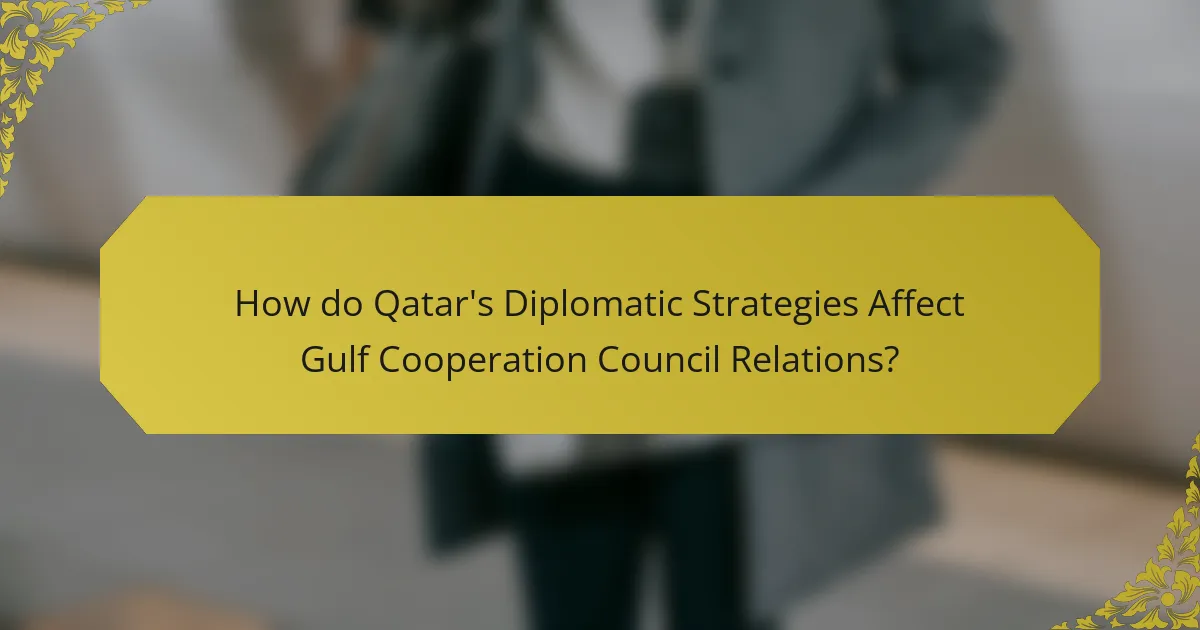
How do Qatar’s Diplomatic Strategies Affect Gulf Cooperation Council Relations?
Qatar’s diplomatic strategies significantly influence Gulf Cooperation Council (GCC) relations. Qatar employs a unique approach characterized by active mediation and independent foreign policy. This strategy often creates tensions with other GCC members, particularly Saudi Arabia and the UAE, who prefer a more unified stance. Qatar’s support for various regional movements, such as the Muslim Brotherhood, further complicates its relationships within the council. The blockade imposed by Saudi Arabia and its allies in 2017 exemplifies the strain caused by these diplomatic choices. Qatar’s efforts to strengthen ties with non-GCC countries also shift the regional power dynamics. Ultimately, Qatar’s strategies both challenge and reshape the traditional GCC framework, leading to ongoing debates about cooperation and conflict among member states.
What are the current dynamics within the Gulf Cooperation Council?
The current dynamics within the Gulf Cooperation Council (GCC) reflect ongoing geopolitical tensions and collaboration efforts. The GCC consists of six member states: Saudi Arabia, Kuwait, the United Arab Emirates, Qatar, Bahrain, and Oman. Recent years have seen a rift, particularly between Qatar and its neighbors, stemming from differing foreign policy approaches. Qatar’s support for groups like the Muslim Brotherhood has led to tensions with Saudi Arabia and the UAE.
In 2021, the GCC reconciliation summit in Al-Ula marked a significant step towards mending relations. This summit resulted in the lifting of the blockade against Qatar, allowing for renewed diplomatic ties. Economic cooperation among member states remains a priority, with initiatives aimed at enhancing trade and investment.
However, underlying issues persist, including differing stances on Iran and regional security. The GCC’s collective response to external threats, such as those posed by Iran, continues to shape inter-member relations. Overall, the dynamics within the GCC are characterized by a blend of rivalry and cooperation, with Qatar’s diplomatic strategies playing a critical role in shaping the current landscape.
How have Qatar’s relations with GCC members evolved recently?
Qatar’s relations with GCC members have improved recently. The reconciliation process followed the 2017 blockade by Saudi Arabia, UAE, Bahrain, and Egypt. In January 2021, a landmark agreement restored diplomatic ties. Qatar has actively engaged in regional dialogues and initiatives. Increased cooperation on security and economic issues has been observed. Qatar’s hosting of the FIFA World Cup in 2022 further enhanced its regional standing. Ongoing discussions focus on collective security and economic integration. This shift indicates a move towards greater unity within the GCC.
What are the implications of the blockade on Qatar’s GCC relations?
The blockade has significantly strained Qatar’s relations with the Gulf Cooperation Council (GCC). It has led to the deterioration of diplomatic ties with key member states like Saudi Arabia and the UAE. Economic repercussions include trade disruptions and reduced access to markets. Qatar has sought alternative alliances, strengthening ties with countries like Turkey and Iran. This shift has altered the geopolitical landscape in the region. The blockade has also prompted Qatar to enhance its self-sufficiency, particularly in food and energy sectors. Additionally, Qatar’s response to the blockade has fostered a sense of national unity among its population. Overall, the blockade has reshaped Qatar’s diplomatic strategies and realigned its relationships within the GCC context.
How does Qatar’s foreign policy impact its alliances within the GCC?
Qatar’s foreign policy significantly influences its alliances within the Gulf Cooperation Council (GCC). This impact is primarily evident through Qatar’s independent diplomatic approach. Qatar often pursues a unique stance on regional issues, which sometimes diverges from the collective GCC position. For instance, Qatar’s support for the Muslim Brotherhood and its engagement with Iran have created tensions with other GCC members, particularly Saudi Arabia and the UAE. Additionally, Qatar’s hosting of various diplomatic negotiations, such as the Taliban talks, showcases its desire to position itself as a mediator. This independent foreign policy can strengthen alliances with nations that share similar views while straining relations with those that oppose its stance. The blockade imposed by Saudi Arabia, the UAE, Bahrain, and Egypt in 2017 exemplifies the repercussions of Qatar’s foreign policy choices on its GCC alliances. Overall, Qatar’s diplomatic strategies foster both collaboration and discord within the GCC framework.
What specific partnerships has Qatar fostered with GCC countries?
Qatar has fostered specific partnerships with GCC countries through various collaborative initiatives. These include economic cooperation agreements with Saudi Arabia and Kuwait. Qatar has also engaged in security partnerships with the United Arab Emirates. Additionally, Qatar and Bahrain have worked together on cultural exchange programs. Joint military exercises have been conducted with Oman to enhance defense collaboration. Qatar’s participation in GCC summits demonstrates its commitment to regional unity. The nation has signed trade agreements with several GCC members to boost economic ties. These partnerships reflect Qatar’s strategic approach to strengthen its relations within the Gulf Cooperation Council.
How do Qatar’s diplomatic strategies influence collective GCC decisions?
Qatar’s diplomatic strategies significantly influence collective GCC decisions through proactive engagement and mediation efforts. Qatar employs a unique approach by facilitating dialogue among member states. This strategy promotes unity and addresses regional disputes. Qatar’s hosting of international summits also enhances its role as a mediator. For instance, Qatar played a key role in brokering peace talks in conflicts involving GCC members. Additionally, Qatar’s use of soft power, including cultural diplomacy, strengthens its influence within the council. By fostering relationships with global powers, Qatar aligns GCC interests with broader international agendas. This multifaceted approach ultimately shapes collective decisions within the GCC framework.
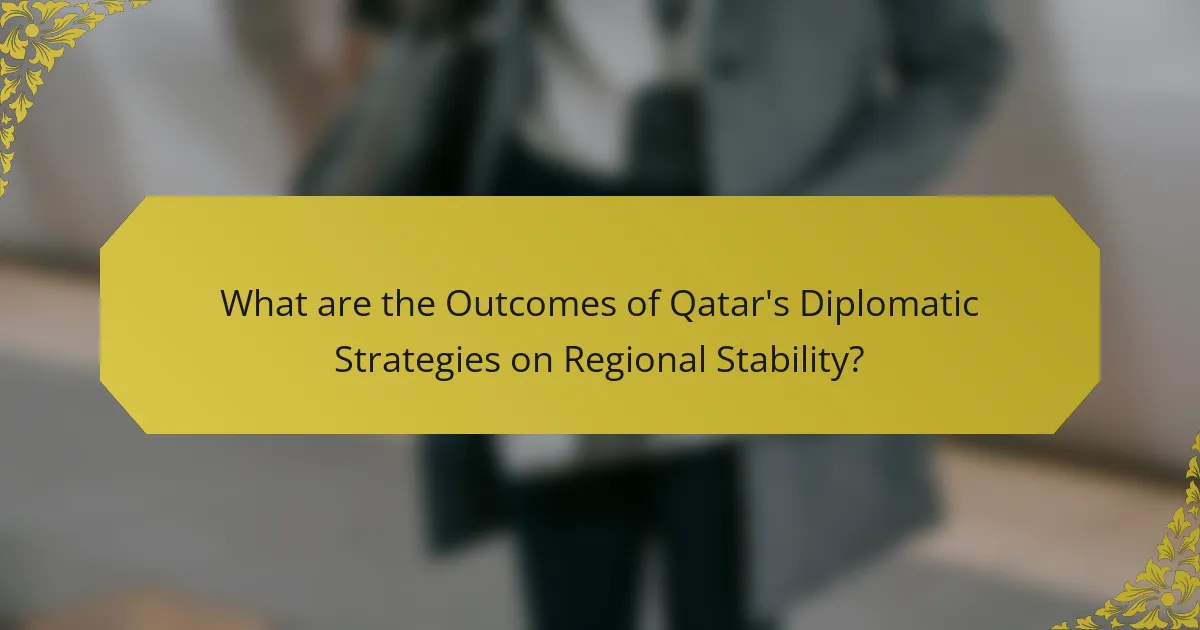
What are the Outcomes of Qatar’s Diplomatic Strategies on Regional Stability?
Qatar’s diplomatic strategies have fostered both stability and tension in the region. These strategies include mediation efforts in conflicts such as those in Libya and Syria. Qatar’s role as a neutral mediator has been recognized internationally. This engagement has led to enhanced dialogue among conflicting parties. Additionally, Qatar’s hosting of international negotiations has strengthened its position as a diplomatic hub. However, its close ties with groups like the Muslim Brotherhood have drawn criticism from neighboring states. This has resulted in a complex relationship within the Gulf Cooperation Council (GCC). Overall, Qatar’s approach has contributed to a multifaceted regional landscape, balancing stability and discord.
How do Qatar’s actions contribute to regional peace initiatives?
Qatar contributes to regional peace initiatives through diplomatic mediation and hosting dialogues. The country has facilitated talks in conflicts such as the Afghan peace process. Qatar’s role as a mediator has been recognized internationally, enhancing its diplomatic credibility. The nation has also provided humanitarian assistance in conflict zones, promoting stability. Qatar’s hosting of various international conferences fosters collaboration among nations. These actions demonstrate Qatar’s commitment to peace and conflict resolution in the region. The effectiveness of its strategies is evident in ongoing negotiations and reduced tensions in specific areas.
What peace-building efforts has Qatar undertaken in the region?
Qatar has engaged in various peace-building efforts in the region. It has acted as a mediator in conflicts such as the intra-Palestinian reconciliation process. Qatar facilitated dialogue between Hamas and Fatah to promote unity. Additionally, Qatar played a role in peace negotiations in Afghanistan. It hosted talks between the Taliban and the United States, aiming for a peaceful resolution. Qatar has also supported humanitarian initiatives in conflict zones, providing aid to affected populations. Its diplomatic approach emphasizes dialogue and negotiation over military solutions. These actions reflect Qatar’s commitment to regional stability and conflict resolution.
How does Qatar’s mediation role affect conflict resolution in the Gulf?
Qatar’s mediation role significantly enhances conflict resolution in the Gulf. It acts as a neutral facilitator among conflicting parties. Qatar has successfully mediated disputes, such as the 2017 Gulf crisis involving Saudi Arabia and its allies. The country leverages its diplomatic relationships to foster dialogue. Qatar’s hosting of peace talks demonstrates its commitment to regional stability. This mediation role is recognized globally, increasing its diplomatic credibility. The effectiveness of Qatar’s approach is evidenced by its involvement in various negotiations, including those in Afghanistan and Sudan. Overall, Qatar’s mediation efforts contribute to reducing tensions and promoting cooperation in the Gulf region.
What challenges does Qatar face in maintaining GCC relations?
Qatar faces several challenges in maintaining GCC relations. One major challenge is the ongoing diplomatic rift with Saudi Arabia, the UAE, Bahrain, and Egypt. This rift began in 2017 when these countries imposed a blockade on Qatar, citing its support for terrorism and close ties with Iran. The blockade severely impacted Qatar’s economy and its regional relationships. Additionally, differing foreign policy priorities create tensions within the GCC. Qatar’s support for groups like the Muslim Brotherhood contrasts with the positions of its neighbors. Lastly, Qatar’s hosting of the 2022 FIFA World Cup raised concerns among GCC members regarding security and regional stability. These factors contribute to a complex diplomatic landscape for Qatar within the GCC.
How do differing political ideologies among GCC members impact Qatar?
Differing political ideologies among GCC members significantly impact Qatar’s foreign policy and regional relations. Qatar often adopts a more independent and sometimes divergent stance compared to its GCC neighbors, particularly Saudi Arabia and the UAE. This divergence is evident in Qatar’s support for groups like the Muslim Brotherhood, which contrasts with the more conservative views of its neighbors.
The 2017 diplomatic crisis, where several GCC countries severed ties with Qatar, exemplifies the tensions arising from these ideological differences. Qatar’s commitment to a more open foreign policy has led to strained relations with countries that prioritize traditional alliances. Economic repercussions also arise, as differing ideologies influence trade agreements and investment opportunities within the region.
Additionally, Qatar’s approach to regional conflicts, such as its involvement in Libya and support for Hamas, further highlights the impact of these ideological divides. This independent stance often leads Qatar to seek partnerships outside the GCC, affecting the overall unity of the council.
What strategies can Qatar employ to strengthen its GCC ties moving forward?
Qatar can strengthen its GCC ties by enhancing economic cooperation. This includes increasing trade agreements with GCC member states. Qatar can also invest in joint infrastructure projects. Collaborative initiatives in energy production can further solidify relationships. Diplomatic engagement through regular high-level meetings is essential. Qatar should actively participate in GCC summits and forums. Cultural exchanges can foster better understanding among member states. Strengthening security collaboration is crucial for regional stability.
What best practices can Qatar adopt to enhance its diplomatic strategies?
Qatar can enhance its diplomatic strategies by prioritizing multilateral engagement. This approach fosters stronger ties with various nations and regional organizations. Qatar should also invest in cultural diplomacy to promote mutual understanding. Hosting international forums can showcase Qatar’s commitment to global cooperation. Furthermore, Qatar must strengthen its economic partnerships to create interdependence. This can be achieved through trade agreements and joint ventures. Additionally, enhancing communication channels with Gulf Cooperation Council members can resolve misunderstandings. Utilizing backchannel diplomacy can also facilitate conflict resolution. These practices can lead to a more influential and respected position in international relations.
The main entity of the article is Qatar’s diplomatic strategies and their impact on Gulf Cooperation Council (GCC) relations. The article examines Qatar’s emphasis on mediation, soft power, and cultural diplomacy, highlighting its historical context, key milestones, and the influence of events like the Arab Spring. It discusses the implications of the 2017 blockade on Qatar’s relationships within the GCC and how differing political ideologies among member states affect diplomatic interactions. Additionally, the article outlines Qatar’s goals, challenges, and potential strategies for strengthening ties with GCC countries while enhancing its regional influence.
